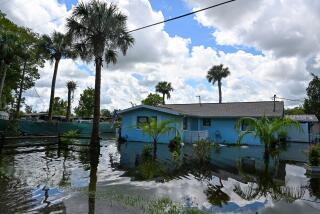Survey Bolsters Global Warming Fight
- Share via
WASHINGTON — In a survey that left business lobbyists stunned and environmentalists gloating, a poll made public Thursday found strong support among Americans for higher gasoline prices, if the increase--up to 25 cents a gallon--would help reduce global warming.
But even after a year of elevated political attention devoted to the phenomenon, the survey found a drop in the percentage of Americans who are concerned about it and a sizable majority who believe that all countries should share in the effort to contain it.
The poll, conducted by the Pew Center for the People and the Press, provides a rare look at public attitudes on environmental and economic questions as international negotiators approach a final round of talks to produce a pact on mitigating the effects of a changing climate.
The poll contained relatively good news for environmental groups and President Clinton.
Of the 1,200 people surveyed last week, 66% said that they had “a lot” or “some” confidence in environmental groups to “strike the right balance between protecting the environment and keeping the economy growing.” Clinton had the support of 61%, congressional Democrats 57%, congressional Republicans 55%, business groups 43%, and labor unions 38%.
But the figures that drew the most attention and surprise were those touching on a potential cost attached to efforts to fight global warming.
Asked whether they would be willing to pay 5 cents more for a gallon of gasoline if the higher price would “significantly reduce global warming,” 73% of those surveyed said yes.
*
“That’s amazing,” said Greg Wetstone, legislative director of the Natural Resources Defense Council.
When the suggested price increase was raised to 25 cents a gallon, 60% said they would be willing to pay.
Oil companies and others opposed to an agreement have focused on potential costs at the gas pump. When informed of the 60% figure, Gail McDonald, director of a lobbying campaign on behalf of business, labor groups and others, was momentarily silent. She then said: “That’s interesting. That’s very interesting.”
She added: “It’s such an essential commodity, people will pay more.”
However, Andrew Kohut, the Pew Center’s director, said that the significance of the broad support for higher gasoline prices “is not whether it is 73% or 50% but that there is a public willingness to make some sacrifices on behalf of the environment.”
Economists, scientists and policymakers continue to debate the likely economic costs of reducing emissions of greenhouse gases. The burning of gasoline, oil, coal and natural gas gives off carbon dioxide, which gathers in the atmosphere and traps the Earth’s heat.
Representatives of 150 countries will gather in Kyoto, Japan, next month for final negotiations on an accord under which industrial nations would reduce their emissions of greenhouse gases.
The U.S. has proposed a system of trading credits to permit the emission of specific amounts of carbon dioxide and bring developing nations into the program.
The poorer countries have balked at committing themselves on the issue, arguing that richer nations achieved economic success only through wide use of fossil fuels and that they are entitled to the same opportunities.
In the survey, 19% of those polled said that developing countries “should not have to bear as much of the burden” for reducing global warming as other countries, while 70% said “all countries should make the same changes.”
A $13-million advertising campaign sponsored by a broad coalition of businesses and labor unions, among others, has portrayed the Kyoto negotiations as giving the developing world a free ride, although the role of the poorer nations has not been determined.
Still, 55% of those surveyed said that the U.S. should join other nations in setting standards to improve the global environment, and 41% backed a go-it-alone approach.
More to Read
Get the L.A. Times Politics newsletter
Deeply reported insights into legislation, politics and policy from Sacramento, Washington and beyond. In your inbox twice per week.
You may occasionally receive promotional content from the Los Angeles Times.










